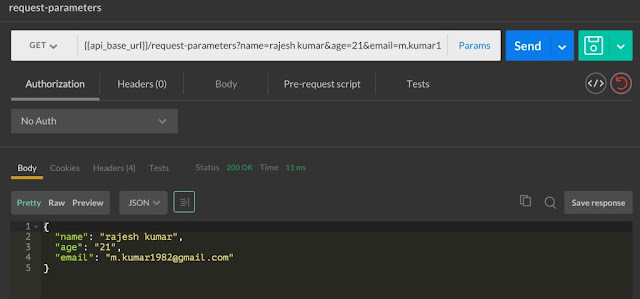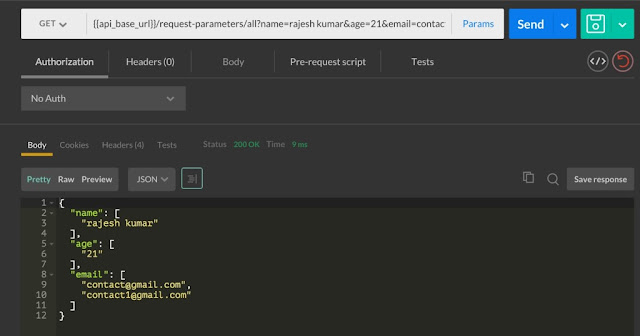In previous post, we talked about, how to use @PathParam annotation to extract the client passed path variable from API HTTP URI, which we defined using @Path annotation. In this guide we will provide example to extract information from HTTP request parameter in all possible ways.
We had tested or used following tools and technologies in this project:
- Jersey (v 2.21)
- Gradle Build System (v 2.9)
- Spring Boot (v 1.3)
- Java (v 1.8)
- Eclipse IDE
This is a part of Jersey (JAX-RS) Restful Web Services Development Guides series. Please read Jersey + Spring Boot getting started guide.
Gradle Build File
We are using Gradle for our build and dependency management (Using Maven rather than Gradle is very trivial task).
File: build.gradle
buildscript {
ext {
springBootVersion = '1.3.0.RELEASE'
}
repositories {
mavenCentral()
}
dependencies {
classpath("org.springframework.boot:spring-boot-gradle-plugin:${springBootVersion}")
}
}
apply plugin: 'java'
apply plugin: 'eclipse'
apply plugin: 'idea'
apply plugin: 'spring-boot'
jar {
baseName = 'jersey-request-parameter'
version = '0.0.1-SNAPSHOT'
}
sourceCompatibility = 1.8
targetCompatibility = 1.8
repositories {
mavenCentral()
}
dependencies {
compile('org.springframework.boot:spring-boot-starter-jersey')
testCompile('org.springframework.boot:spring-boot-starter-test')
}
eclipse {
classpath {
containers.remove('org.eclipse.jdt.launching.JRE_CONTAINER')
containers 'org.eclipse.jdt.launching.JRE_CONTAINER/org.eclipse.jdt.internal.debug.ui.launcher.StandardVMType/JavaSE-1.8'
}
}
task wrapper(type: Wrapper) {
gradleVersion = '2.7'
}
Spring Boot Main Method Class
Spring Boot Main Method Class is the starting point for the Spring Boot based application just like normal java application.
File: JerseyRequestParameterApplication.java
package in.geekmj;
import org.springframework.boot.SpringApplication;
import org.springframework.boot.autoconfigure.SpringBootApplication;
@SpringBootApplication
public class JerseyRequestParameterApplication {
public static void main(String[] args) {
SpringApplication.run(JerseyRequestParameterApplication.class, args);
}
}
Jersey Configuration Class
Jersey Configuration class is a ResourceConfig class for providing Jersey specific configuration and Resources entry.
File: JerseyConfig.java
package in.geekmj.config;
import javax.ws.rs.ApplicationPath;
import org.glassfish.jersey.server.ResourceConfig;
import org.springframework.stereotype.Component;
import in.geekmj.resource.RequestParameterResource;
@Component
@ApplicationPath("/")
public class JerseyConfig extends ResourceConfig {
/*
* In constructor we can define Jersey Resources & Other Components
*/
public JerseyConfig() {
register(RequestParameterResource.class);
}
}
Resource Class
File: RequestParameterResource.java
package in.geekmj.resource;
import java.util.HashMap;
import java.util.List;
import java.util.Map;
import javax.ws.rs.Consumes;
import javax.ws.rs.DefaultValue;
import javax.ws.rs.GET;
import javax.ws.rs.Path;
import javax.ws.rs.Produces;
import javax.ws.rs.QueryParam;
import javax.ws.rs.core.Context;
import javax.ws.rs.core.MediaType;
import javax.ws.rs.core.UriInfo;
@Path("/request-parameters")
@Produces(MediaType.APPLICATION_JSON)
@Consumes(MediaType.APPLICATION_JSON)
public class RequestParameterResource {
/*
* We can inject request parameters as instance variables using @QueryParam
*/
@QueryParam("email")
private String email;
/* We can inject request parameters as method s using @QueryParam */
@GET
public Map getRequestParameters(@QueryParam("name") String name,
@DefaultValue("18") @QueryParam("age") int age) {
Map requestParametersAndValues = new HashMap();
requestParametersAndValues.put("name", name);
requestParametersAndValues.put("age", String.valueOf(age));
requestParametersAndValues.put("email", email);
return requestParametersAndValues;
}
/*
* We can get a map of all request parameters name and value using UriInfo
* context injection
*/
@GET
@Path("/all")
public Map<> getRequestParametersUsingContext(@Context UriInfo ui) {
return ui.getQueryParameters();
}
}
email request query parameter is injected as instance variable using @QueryParam annotation.
Two API URIs created in the resource class:
- /request-parameters – Implemented in method
getRequestParameters, it inject request query parametersnameandageusing@QueryParamannotation. - /request-parameters/all – Implemented in method
getRequestParametersUsingContext, it returns any request query parameters passed to API URI. Using@ContextUriInfo has been injected as method parameter.UriInfo.getQueryParameters()return MultivaluedMap<String,String> with query parameters values.
URI – https://localhost:8080/request-parameters/all?name=rajesh kumar&age=21&[email protected]&[email protected]
 Testing Jersey Request Query Parameters API URI /request-parameters. Three query parameters name, email and age is passed to URI and they are returned back as JSON name and value pair in response.
Testing Jersey Request Query Parameters API URI /request-parameters. Three query parameters name, email and age is passed to URI and they are returned back as JSON name and value pair in response.
URI – https://localhost:8080/request-parameters/all?name=rajesh kumar&age=21&[email protected]&[email protected]
 API URI /request-parameters/all will return JSON response with name and value corresponding to any query parameters passed.
API URI /request-parameters/all will return JSON response with name and value corresponding to any query parameters passed.References
- What is Request Query String or Parameter?
- Official Jersey Documentation
- Download the Full Project
- Follow Project On Github